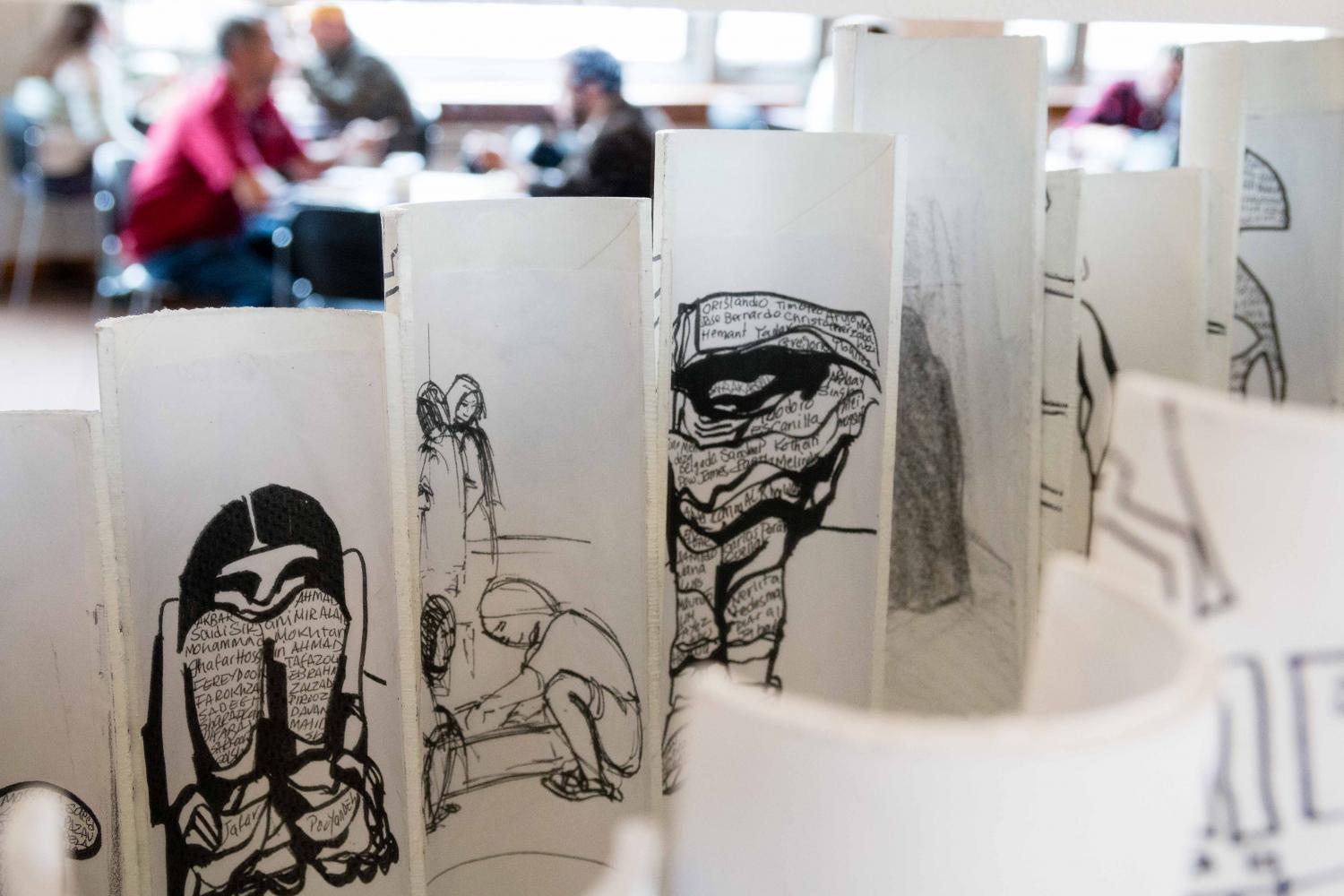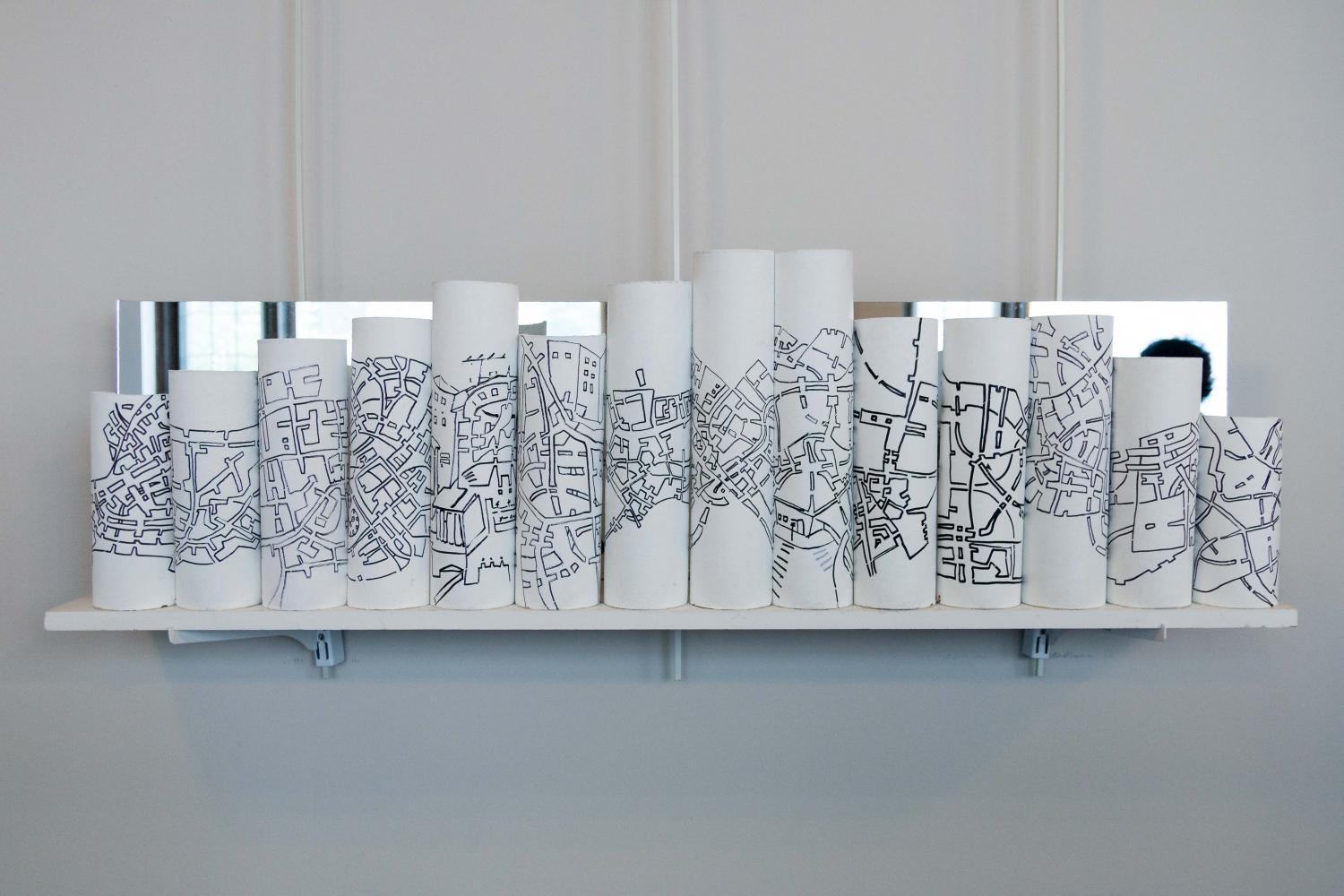Middle East to Midwest Exhibit Educates CU Area on Global Issues
Activists 1983 by Narsin Navab sits on display at the University YMCA. From Middle-East To Midwest: Evoking Solidarities Across Time and Space by Nasrin Navab and Nahid Navab will be on display at the University YMCA at Wright and Chalmers on Thursday from 5-7p.m., and will remain on display through November 2.
Sep 7, 2017
The YMCA has plans to further educate the University community on global issues using art.
On September 7, from 5 to 7 p.m., the University YMCA will host an art exhibit covering international issues such as women’s rights, political activism and freedom of speech.
The exhibit, “From Middle-East to Midwest: Evoking Solidarities Across Time & Space,” closely aligns with issues that the organization wants to promote like cultural understanding and social justice.
Two immigrant sisters from Iran, Nasrin and Nahid Navab — who have shown collections in countries such as Turkey, Iran and China — collaborated to form the project.
Art at the YMCA showcases different art exhibits annually, up to six times a year.
Get The Daily Illini in your inbox!
Ann Rasmus, employee at the YMCA, is in charge of the art exhibits and said she is eager for students to see the globally renowned works.
“This is a great opportunity to see excellent work that is nationally and internationally known, which is now on campus,” Rasmus said. “It’s a chance to learn about personal and important stories.”
Rasmus said the YMCA wants to bring broad topics to the table through the art exhibit.
“The mission is to support broader concepts like social justice, environmental action and cross-cultural understanding,” Rasmus said. “Bringing art to the YMCA brings a voice to these works. I think this exhibit will bring a very personal human element to the immigrant story.”
The art pieces on display cover a variety of personal experiences from both artists on a personal level as well as issues that have been covered in the news.
 Austin Yattoni
Austin Yattoni
Nasrin has been politically active in Iran and talked about some of her experiences while living through the Iran-Iraq war.
“During the revolution, I was a student, and all Universities closed because they could not control the students and protests,” Nasrin said. “A vast number of students were activists, including myself, and were imprisoned for three and a half years.”
During her time in prison, Nasrin kept a memoir of paintings, drawings and writings about her experiences. She incorporated this journal into many of the pieces seen throughout the exhibit.
“Most of my work was me responding to the things I saw,” Nasrin said. “One of the most important things in life and in the work is the freedom of speech which can be endangered.”
After serving time, Nasrin traveled to the U.S. for six years and eventually moved back to Iran. She was not allowed to leave the country for nine years.
In those years, she watched journalists around the world get captured and killed and factory workers in Bangladesh lose their lives. Her personal experiences impacted her artwork, political activism and fight for justice.
“Some 1,200 factory workers lost their lives doing very laborious work,” Nasrin said about the Savar building collapse in 2013. “Most of those workers were also very young women. Seeing that in the news was devastating. A few pieces of my work are dedicated to those who lost their lives, including the journalists who were also captured and killed.”
She said her work is something she hopes will help educate people on what is happening in the world.
Not only has Nasrin dedicated her art to her personal experiences but her sister, Nahid, has as well, commemorating immigrants, women and activists around the world.
“Our issues are international issues and many can relate,” Nahid said. “Issues about women and protests are issues that can be applied to places like Bangladesh or even Hurricane Katrina.”
After traveling to Iran within recent years, Nahid will host several talks around campus, including the opening of the exhibit to discuss current issues in contemporary art in the Middle East.
The Navab sisters created this exhibit over many years and accumulated experiences and impressions on events that have affected their lives.
“Our work and our audience are connected,” Nahid said. “We chose Champaign because we know our audience is concerned about these issues.”
As the sisters worked on their exhibit, they reflected upon what these pieces have allowed them to contribute. They agreed it is a way to express themselves and communicate to others.
“It always has been a means for me to work towards justice,” Nasrin said. “It is a way to talk through art.”
Correction: An earlier version of this article was not clear about the touring status of the collection; it has not toured internationally. Also, Nasrin’s work on journalists and factory workers did not come specifically from her stay in Iran. The Daily Illini regrets the errors.






